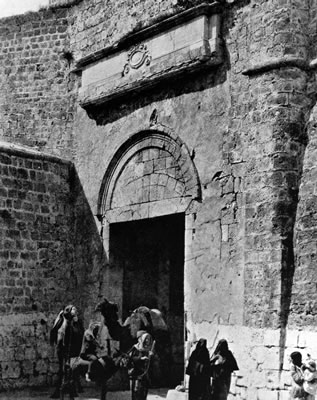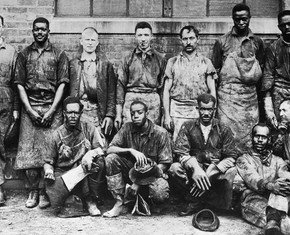The views expressed in our content reflect individual perspectives and do not represent the authoritative views of the Baha'i Faith.
The first Christian to recognize Baha’u’llah and become a Baha’i, the Syrian physician Faris Effendi, sent him a beautiful, heartfelt letter.
In his tablet to Raḍ’ar-Ruḥ, Baha’u’llah, referring to the letter by Faris Effendi, states that “whosoever desires may read it.” Baha’u’llah made this possible by incorporating the text of Faris Effendi’s letter at the end of his tablet. Faris’s letter to Baha’u’llah has only been partially translated, as follows:
O Thou Glory of the All Glorious, and the Exalted One of the Most Exalted … ! I am honored to write and send this supplication to Thy Presence. … They did to Thee what they did to Jesus, the Manifestation of His Wisdom. … They became the scattered and lost sheep of the herd. … May I entreat Thee to include my people and myself amongst those who are saturated by the bounties of the oceans of Thy grace. … Thou art the Ever-Abiding, Ever-Flowing Fountain of Purity and Holiness. … I supplicate Thee by Thy innermost Secret, by Thy Kalím [“Interlocutor,” i.e. Moses], by Thy Son [Jesus], by Thy Habib [“Beloved,” i.e. Muḥammad], and by Thy Forerunner [the Bab] Who embraced the Cross for the sake of His love for Thee, … that Thou may not deprive me and my poor family from beholding the light of Thy Countenance. … Make our faith complete, choose us to serve the chosen ones amongst Thy servants, and accept us as martyrs, who offered their blood for the sake of Thy love. …
We are weak, ignorant and unworthy, do not make us of the losers. … Give us the bounty of love, faith and hope and enable us to tear away from our hearts that which pleaseth Thee not. … Make us forget ourselves. We demand no comfort except in that which pleaseth Thee. Thou art the Searcher of hearts. … A wooden vessel is carrying Thee. How intensely do I long to be in Thy company! …
O Sea! What hath befallen thee? I see thee disturbed. Is it because of the fear of thy Lord, the Most Great? O, Alexandria! I see thee sad because of the departure of thy Lord, the Living, the Most Patient. The dilapidated city of Akka is clapping its hands to welcome Thee with great joy. It is rejoicing because it can welcome the Greatest of all Glories. – Abu’l-Qasim Faizi, “From Adrianople to Akka,” in Conqueror of Hearts: Excerpts from Letters, Talks, and Writings of Hand of the Cause of God Abu’l-Qásim Faizí.
Previously, Faris has been referred to as a “physician,” as well as a “Syrian.” He has also been described as a “priest.” There is evidence of this in the nature and wording of Faris’s letter to Baha’u’llah.
As befits its intended recipient, Baha’u’llah, Faris’s letter is quite formal, yet expressive—rich and replete with theological and theophanic expressions of respect and love.
After addressing Baha’u’llah in these highly respectful terms, Faris compares Baha’u’llah to Jesus Christ, recognizing both as messengers of God, each of whom suffered persecution. Their respective, wayward persecutors consequently became “the scattered and lost sheep of the herd.” Faris broadens this comparison by referring to Baha’u’llah as the latest in a line of successive prophets, including Moses, Jesus, Muḥammad and the Bab. So dedicated is Faris that he offers up his life as a “martyr,” if that should come to pass.
Faris then refers to the ship (a “wooden vessel”) that is carrying Baha’u’llah to the fortress-prison of Akka. In spiritually metaphorical language, Faris personifies, first, the “Sea,” then Alexandria, then the “dilapidated city of Akka.” In poetic ways, Faris calls out to each of these three locations, saying that the very “Sea” itself senses the awesome presence and power of Baha’u’llah, and trembles in its fear of God, as manifested by Baha’u’llah. The city of Alexandria is described as “sad,” disconsolate over the fact that Baha’u’llah is departing. Yet the prison-city of Akka is joyful over the imminent arrival of Baha’u’llah.
All of this takes place metaphorically, invisibly, spiritually, and in a way that shows creation itself recognizes the power and authority of Baha’u’llah, to which all people, save for a few, are oblivious.
The martyrdom of the Bab is directly analogized to the “Cross” on which Jesus Christ suffered and died. This analogy goes beyond the fact that both were messengers of God, and that each were martyred in the path of God. By establishing a historical equivalence between the Christ and the Bab, Faris implies that the Bab also gave his life for the sins of the world.
Faris’s letter to Baha’u’llah is a declaration of belief in and dedication to Baha’u’llah. Far from abandoning his Christian heritage—and without renouncing, in the least, his allegiance to Jesus Christ—Faris bears witness that Baha’u’llah represents the fulfillment of Christ’s promises, and that Baha’u’llah manifests the “spirit and power” of Christ, in symbolic fulfillment of Christ’s prophecies and those of all God’s messengers and prophets:
Afterwards, the companions and disciples of Jesus asked Him concerning those signs that must needs signalize the return of His manifestation. When, they asked, shall these things be? Several times they questioned that peerless Beauty, and, every time He made reply, He set forth a special sign that should herald the advent of the promised Dispensation. To this testify the records of the four Gospels. …
Judge fairly: Were the prophecies recorded in the Gospel to be literally fulfilled; were Jesus, Son of Mary, accompanied by angels, to descend from the visible heaven upon the clouds; who would dare to disbelieve, who would dare to reject the truth, and wax disdainful? Nay, such consternation would immediately seize all the dwellers of the earth that no soul would feel able to utter a word, much less to reject or accept the truth. …
It is clear and evident to thee that all the Prophets are the Temples of the Cause of God, Who have appeared clothed in diverse attire. If thou wilt observe with discriminating eyes, thou wilt behold them all abiding in the same tabernacle, soaring in the same heaven, seated upon the same throne, uttering the same speech, and proclaiming the same Faith. Such is the unity of those Essences of being, those Luminaries of infinite and immeasurable splendour. Wherefore, should one of these Manifestations of Holiness proclaim saying: “I am the return of all the Prophets,” He verily speaketh the truth. In like manner, in every subsequent Revelation, the return of the former Revelation is a fact, the truth of which is firmly established. – Baha’u’llah, The Book of Certitude, p. 22; pp. 80–81; pp. 154–155.
You May Also Like
Comments


















Beautiful! That's nondual consciousness.